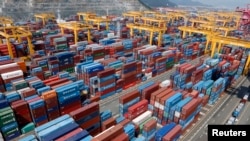South Korea said it will offer tax and loan concessions to firms hit by trade sanctions China imposed in retaliation for Seoul’s deployment of a powerful defense system, highlighting the broader impact of intensifying tensions on the Korean Peninsula.
The government plans to allow duty free firms and other retailers operating in China to defer all or part of their corporate income and value-added taxes for up to nine months, the finance ministry said Thursday.
The ministry will also offer cheap loans to auto-component makers hit by declining sales of South Korean cars in China.
THAAD concerns
The United States deployed missile shield, known as the Terminal High Altitude Area Defense (THAAD), to South Korea this year to guard against North Korea’s shorter-range missiles. That has drawn fierce criticism from China, which says the system’s powerful radar can probe deep into its territory.
In retaliation, Beijing has imposed boycotts on South Korean goods traded in the mainland, raising pressure on the Moon Jae-in administration to help firms hit by China’s curbs.
Thursday’s measures, aimed at making up the losses suffered by the tourism and auto sectors, show the government has limited options to counter Beijing’s sanctions, said Stephen Lee, an economist at Meritz Securities.
Seoul's hands tied
“There isn’t much Seoul can do as these issues have been originating from China. There’s little the government can do in terms of making up for the loss incurred (by South Korean businesses,)” Lee said.
“Seoul can continue to announce micro-measures to buffer any shocks (from the THAAD issue), but it’s too difficult to resolve the problem by removing the THAAD now,” Lee added.
The finance ministry said it plans to boost domestic tourism to compensate for declining inbound Chinese tourists.
The number of Chinese tourists, which used to account for about half of all visitors to South Korea, halved in the first seven months of 2017 compared to a year ago. That translates to $5.1 billion in lost business for South Korea, based on the average spending of Chinese visitors in 2015, data from the Korea Tourism Organization shows.
Partly because of the THAAD backlash, Hyundai Motor Co.’s retail sales in China, the world’s biggest auto market, slumped 29 percent in the first half of 2017.
Seoul has said it plans to boost funds at policy banks by up to 500 billion won ($437.14 million) to help car component makers and other suppliers heavily reliant on sales to Hyundai Motor and Kia Motors.
